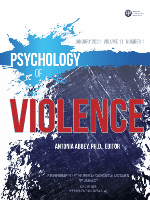Multiple group identities and support for violent radicalization among college and university students: Challenge or opportunity?
Objective: Group processes and identities play a crucial role in the development of positive attitudes toward violent radicalization (VR). However, we do not know much about the impact of specific group identities on support for violent radicalization and the mechanisms that can explain how such associations unfold. This study investigates the independent and cumulative associations between multiple group identities and support for violent radicalization among Canadian college and university students and the potential moderating role of in-group identification and perceived public collective self-esteem in these associations. Method: Students (N = 5,598; Mage = 22.8; SDage = 7.5; 68.0% women) completed an online survey. Mixed-effects linear regression models and interaction analyses were implemented. Results: Identities related to political, gender, and sexual orientation groups were independently and cumulatively associated with higher support for violent radicalization (polarizing), whereas identities related to religion, profession, ethnicity, age, or leisure activities were cumulatively associated with lower support for violent radicalization (nonpolarizing). Identities related to religion and profession were independently associated with lower support for violent radicalization. The magnitude of associations between cumulative polarizing identities and support for violent radicalization was larger at low levels of perceived public collective self-esteem and high levels of in-group identification. Conclusions: Prevention efforts need to situate students’ identity development within the broader societal context, in a socioecological perspective. Supporting students’ multiple identities is a promising strategy to prevent violent radicalization, if we simultaneously work on local dynamics in order to enhance inclusion in schools and societies. (PsycInfo Database Record (c) 2024 APA, all rights reserved)
Members and SHERPA Teams

Cécile Rousseau
Professor, Division of Social and Transcultural Psychiatry, Université McGill

